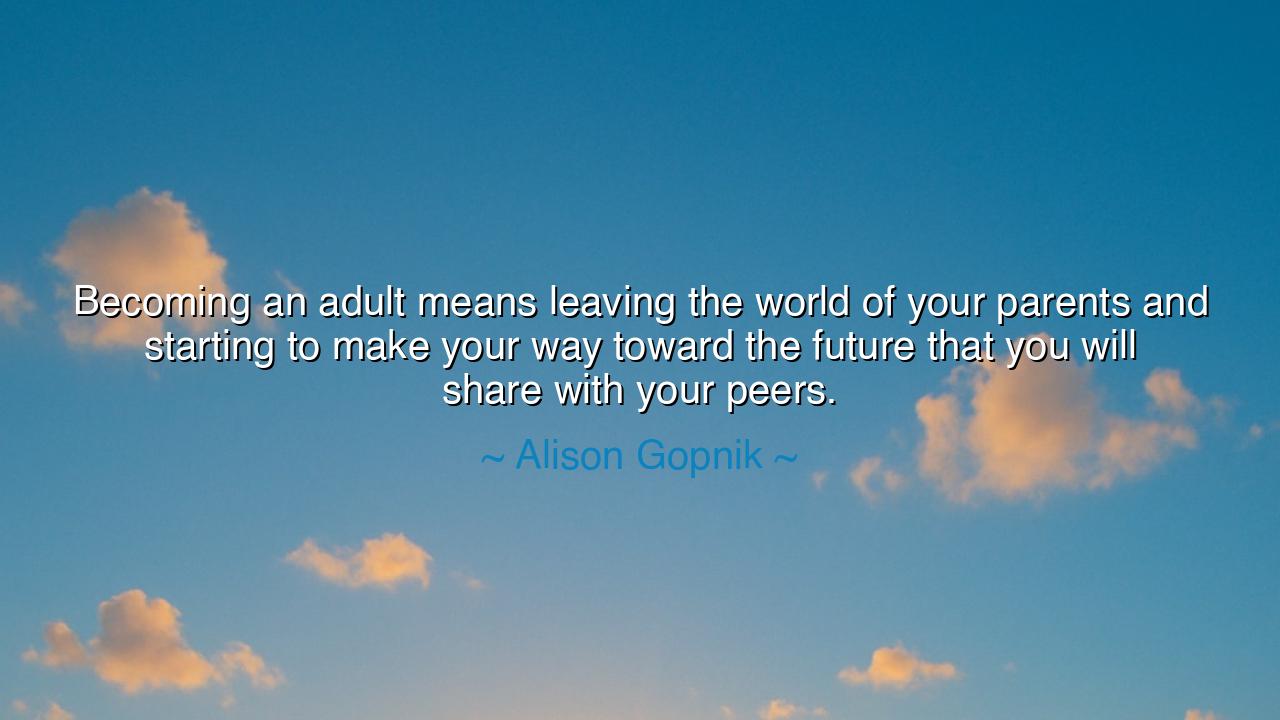
Becoming an adult means leaving the world of your parents and
Becoming an adult means leaving the world of your parents and starting to make your way toward the future that you will share with your peers.






"Becoming an adult means leaving the world of your parents and starting to make your way toward the future that you will share with your peers." These profound words by Alison Gopnik speak to the essence of growing up—a journey that requires one to break free from the protective embrace of family and step into the vast unknown of the world that awaits. To become an adult is to leave behind the shelter and comfort of parental care and take on the responsibility of shaping one's own path, while learning to forge connections with those who will accompany you in this new chapter of life. It is a shift from dependence to independence, where you no longer walk in the shadows of those who raised you, but stand in the light of your own future, ready to contribute to the greater world.
In the ancient world, this rite of passage was marked by profound ceremonies that symbolized the transition from childhood to adulthood. Among the Spartans, for example, young boys were taken from their families at the age of seven and thrust into the harsh realities of military training. It was not just a test of physical strength but also of mental resilience, for they were being shaped into warriors who would one day stand beside their peers to defend their land. In this transformation, they left the world of their parents behind, not in rebellion, but in preparation for the greater challenges of life ahead. The strength of the Spartan warriors lay not only in their ability to fight but in their ability to forge bonds with one another, as peers, as equals, united in a shared future.
This journey toward adulthood is not just about physical separation from parents; it is a psychological and emotional evolution. Consider the story of Odysseus, the hero of Homer’s Odyssey. When he leaves his home in Ithaca to fight in the Trojan War, he is leaving behind everything familiar, including his wife Penelope and son Telemachus. Yet, it is not until years later, after wandering through many trials, that Odysseus fully understands what it means to return home—not just physically, but emotionally. His reunion with his son, who has matured in his father’s absence, symbolizes a passing of the torch—a recognition that the world he returns to is not the one he left behind, but a world that is now shared by the next generation, one that is shaped by their own experiences and choices.
In more recent times, the coming-of-age journey is seen in individuals who, despite being raised in one world, must step into a new reality formed by their peers. Take the example of Mahatma Gandhi, who left his home in India to study in England. In England, he was not the son of a respected Indian family but a young man with a vision for his future. It was there, among peers, that Gandhi began to form the principles that would shape his leadership in India’s fight for independence. Just as Odysseus’s journey to Troy marked a pivotal moment in his life, Gandhi’s time away from his family allowed him to step into the world of his generation, where his ideas and actions would align with those of his peers, changing the course of history.
The quote from Gopnik also speaks to the importance of peer influence in the formation of adulthood. Once we step away from our families, we enter a world where we must learn from one another, challenge each other, and grow together. The future that we share with our peers is shaped not by what our parents have taught us, but by what we learn from those who walk beside us. The renaissance artists, for example, did not work alone in their pursuits; they were part of a broader movement where the exchange of ideas between Leonardo da Vinci, Michelangelo, and other peers shaped the world of art and innovation. Their individuality was nurtured in the context of collaboration, where the idea of mutual growth and shared vision was paramount.
To take this lesson into our own lives, we must recognize that becoming an adult is not simply about separating from our families or taking on the responsibilities of the world. It is about learning to navigate the space between the world of our childhood and the world of our peers. It is about finding a balance between the wisdom passed down to us and the lessons we must learn through our own experiences. The future we will share with others is not predetermined—it is shaped by the relationships we build, the choices we make, and the values we uphold.
Therefore, as you walk the path from childhood into adulthood, remember that the journey is not just about leaving behind the old world of parental care, but about stepping into a new world where the connections you form with your peers will guide you. Just as Odysseus returns to a home he no longer recognizes, you too will one day look back and see how the world has shifted around you. But it is through your own experiences, your relationships, and your growth that you will find your place in this shared future. Embrace the challenge of stepping forward, of growing alongside those who will walk with you, for it is through them that your true path will be revealed.






AAdministratorAdministrator
Welcome, honored guests. Please leave a comment, we will respond soon